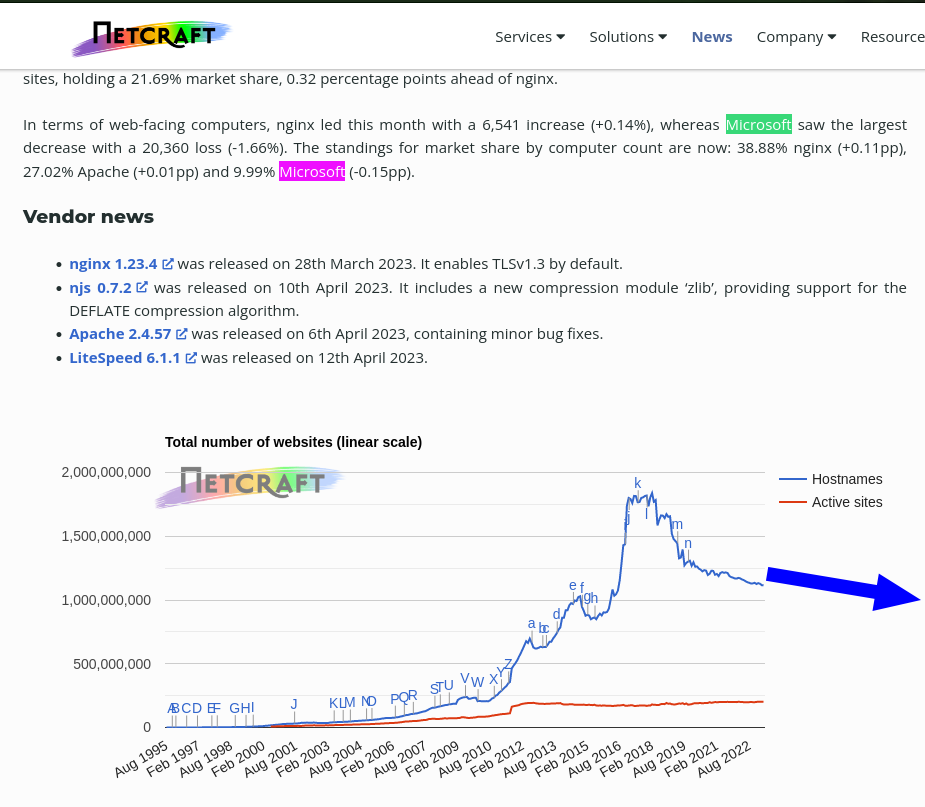
 Divestment illustrated; notice how many domains got canceled in recent years (relinquished, never to be adopted by somebody else)
Divestment illustrated; notice how many domains got canceled in recent years (relinquished, never to be adopted by somebody else)
"People should not have to run proprietary scripts, enable DRM etc. just to read some article. It's neither safe nor practical."Sadly, as we've just noted, the Web has increasingly become a spyware platform. Alex Oliva published an article related to this yesterday (Brazil time). We won't stop urging people to move over to Gemini if what they're truly into is information in textual form. People should not have to run proprietary scripts, enable DRM etc. just to read some article. It's neither safe nor practical.
The bloat (or "webloat" as some call it) has doomed the Web as we once knew it. The Web is shrinking over time (more sites shut down than sites created), so we need to plan for contingencies and advocate them as viable alternatives.
"Self-hosting is a pre-requisite in the fight against censorship and other forms of repression."Gemini isn't just lighter; it's vastly cheaper to operate and it can easily be hosted from home (in April I sent half a million pages from home, as GemText is light so latency isn't a problem).
Self-hosting will rely on lessened complexity. Self-hosting is a pre-requisite in the fight against censorship and other forms of repression.
Today's World Wide Web Consortium is just a sum total of monopolies and imperialistic firms. Tim B-L ceded control. We should be thankful for what he did in the 90s. Now we need to replace what his original creation has sadly become. This may take a long time, but it is doable. Just as social control media suffers a legitimacy crisis (bans proposed worldwide and Twitter rapidly collapsing; there's another outsage now [5]) the Web too deserves more widespread condemnation, or at least harsher criticism. ⬆
Related/contextual items from the news:
"The web setting out as something which was universal, something which anybody could use, I felt was very important," he said. "It's no good having something which will run on any platform if, in fact, there is a proprietary hold on it."
Berners-Lee eventually convinced CERN to release the World Wide Web into the public domain without any patents or fees. He has since attributed the runaway success of the web to that single decision.
History of the Web compares and contrasts the license-free web with another internet protocol at the time, Gopher: [...]
In February of 1993, the University of Minnesota made an announcement. In specific commercial usage of the protocol, they would be charging licensing fees. Not large fees, and not in all cases. But, in some small way, they would be restricting access.
Overnight, sentiment shifted. Internet users took to BBS boards and mailing lists to express outrage about Gopher’s decision. IBM declared that they wouldn’t support internally any protocol with restrictive licensing. The world began searching for alternatives.
Back at CERN, Berners-Lee had just the thing. He was already in early conversations with CERN about an open-source license for the platform. But after the Gopher announcement, he changed that request. He didn’t want any restrictions at all, no rights or attachments at all. The web needed to be free. Truly free.
Too vague, apparently — and so at first, nothing happened. But Berners-Lee kept working on his idea. And slowly, the individual components of what would become the World Wide Web took shape: URLs for web addresses had to be created, HTML to describe the pages as well as the first web browser.
The result was revealed to the global public exactly 30 years ago: On April 30, 1993, the researchers at CERN launched the World Wide Web and it was the beginning of the stellar rise of the [Internet].